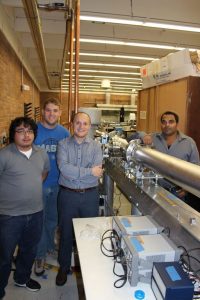Mentor: Subith Vasu
Description: Students will investigate ignition times and soot formation in a shock tube using laser spectroscopy diagnostics. Improving the performance of advanced hypersonic engines (e.g. scramjets) that are capable of handling future renewable fuels (e.g. biofuel) warrants introducing scientific designs in which the use of chemical kinetics will be essential and critical for reducing emissions that cause climate complications (such as soot). Ignition time is an important fundamental parameter in the combustor design of practical engines, including gas turbines, and its dependence on temperature, pressure and composition is critical in describing the combustion performance. A shock tube is an excellent lab facility to generate conditions that exist in engines with remarkable reproducibility. The shock tube is a long tube with two parts separated by a diaphragm and the sudden bursting of the diaphragm (by pressurizing one side, see for details) creates a stagnant region behind the reflected wave which is held at test pressure and temperature. Laser diagnostics offer a non-intrusive and quantitative technique to measure soot volume fraction and induction time, which will be measured in biofuels using the technique that the we successfully used in diesel-relevant fuels in which soot-induced light-extinction was utilized. We plan to conduct these experiments for a wide range of pressures from 1 to 300 atm and temperatures from 700 to 2500 K for different biofuel/oxidizer combinations. Also, detailed chemical kinetic modeling study will be conducted using software programs where the current experiments would serve as excellent validation targets.
The REU student will be trained under the direction of the faculty mentor. The student will be tasked with conducting experiments that measure combustion performance. Some simulations will be carried out using various software tools. Graduate students and postdocs from VasuLab will provide assistance.

One of the shock tube facilities at the VasuLab.